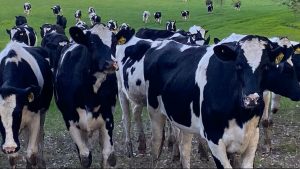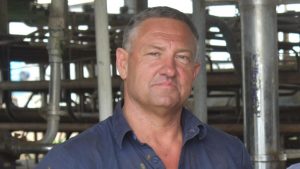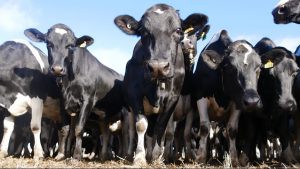
Steve grew up with Ayrshires and when he moved to a new farm 20 years ago that was home to a Holstein herd, there was never a question about bringing his Ayrshires.
“I was born and bred with Ayrshires and they are close to my heart and a part of me, and they certainly will always have their place in my herd,” he said.
Today Ayrshires constitute about half the herd run by Steve and his wife Rachel along with his parents John and Joy at Gooloogong in central-west NSW between Cowra and Forbes.
They milk about 125 Ayrshires and a similar number of Holsteins on their 526-hectare farm and Steve says the mix works well.
Apart from sentimental value, the Ayrshires also hold their own in production and punch above their weight when it comes to health traits and fertility.
Their success is no overnight sensation.
Steve’s grandfather Eric Eagles started with Ayrshires when he got back from World War II and established the Paschendaele Ayrshire Stud around 1954.
They were on a small farm at Camden, NSW, just 52ha, and when deregulation hit in 2000, it was no longer viable.
“We sold and moved out here to a larger farm to milk more cows and keep going,” Steve said. “The farm we bought was milking 180 Holsteins and we bought that herd and started to register them.”
However, he wasn’t going to leave the Ayrshires behind. They were integrated into the expanded herd and continue to mix well and contribute to the farm’s success
“They’re altogether in the same paddock and do the same thing,” Steve said. “The Ayrshires certainly have their spot.”
Eric’s legacy continues through the Blossom family.

One of the pleasures of being a dairy farmer for Steve is to show his prize cattle, a passion started years ago by John.
The stud has found success with various champions over the years at Sydney, Melbourne and Adelaide shows along with International Dairy Week.
“We’ve been quite successful and it’s something I love doing,” Steve said. “It helps to keep you going when you’re milking a cow and you know she’s special.”
The Blossom family takes pride of place in the herd. “They started with my grandfather’s first registered Ayrshires and that family is probably our strongest home-bred family and they continue to produce the highest quality cows in our herd,” Steve said.
After a lifetime dealing with Ayrshires, Steve is in no doubt that he’s working with an improved cow.
“They’ve improved hand-over-fist over the years,” he said. “Years ago, they didn’t have as much milk as the Holsteins but they had more protein and butterfat, but with genetics those lines have come closer together.”
Health and fertility traits really stand out.
“The Ayrshires are less prone to milk fever, they’re easier to get in-calf and have fewer calving problems and they are more mastitis resistant with better cell counts,” Steve said.
Sometimes it comes down to toughness. “They have a bit more grunt in them,” Steve said.
“You can have problems with any breed, but when an Ayrshire goes down, they try a bit harder to get back up. I see that in my herd; they have better longevity and will to live. As an average, we get a couple more lactations out of them.
Thanks to genetics, the size of Ayrshires has increased over the years which suits the Eagles farm.
“Our cows have to walk a long way, and the Ayrshires are generally pretty good on their feet and legs. If they weren’t, they wouldn’t last on a large farm with grazing,” Steve said.
There’s another benefit from being part of the Ayrshire fraternity. “We’ve met many friends throughout the world through the breed, in England, Canada, America, New Zealand and throughout Australia,” Steve said.
“Not having shows the past couple of years has been disappointing but we’re looking forward to having a catch up again soon.”
Ayrshires will continue to play a part in the farm’s future. Steve and Rachel’s three children, 11, 9 and 7, are already saying that when they grow up, they’re going to run the farm.

























